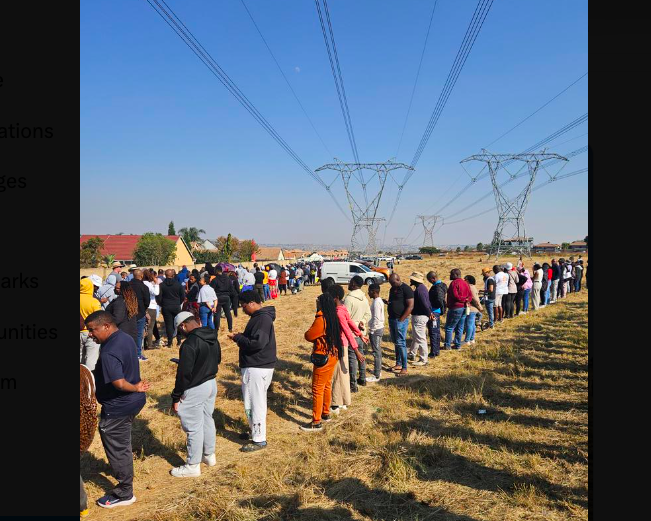Johannesburg – South African voters queued – many of them for hours – to cast their ballots on Wednesday in a landmark general election that leaves the ruling ANC fighting to protect its three-decade-long exclusive grip on power.
More than 27 million voters are registered for the most uncertain poll since the African National Congress led the nation out of apartheid rule, but with voting delayed in many districts, some were forced to wait.
With opposition challenges from both the left and right, unemployment and crime at near record levels and a new generation growing up with no memory of the struggle against white-minority rule, the ruling party may lose its absolute majority and be forced to share power.
The Independent Electoral Commission (IEC) said it projected turnout to go “well beyond” the 66 percent recorded in the last election in 2019.
“We are experiencing a late surge and are processing a large number of voters” in big cities, IEC’s head Sy Mamabolo told a press conference.
Thousands of South Africans were still waiting in hours-long queues outside polling stations after nightfall, just over an hour away from their planned closure.
All those who joined the line before closing time would be allowed to vote, Mamabolo said.
Earlier the IEC said seven percent of stations opened late because of delays in delivering election materials.
After voting, President Cyril Ramaphosa, who is seeking re-election, said: “I have no doubt whatsoever in my heart of hearts that the people will once again invest confidence in the ANC to continue leading this country.”
But John Steenhuisen, leader of the biggest opposition party the Democratic Alliance (DA), predicted no single party would win an outright majority, creating an opening for his party and an alliance of smaller outfits.
“For the first time in 30 years, there’s an opportunity for change in South Africa”, he said after voting in his home city, Durban.
‘Need of change’
In Soweto, the president’s hometown and unofficial capital of the anti-apartheid battle, elderly ANC loyalists turned out early but, as the queues lengthened, there were signs of disillusionment among younger voters.
Kqomotso Mtumba, a 44-year-old bank official, sporting burgundy and black beaded braids, said she voted ANC in the past but had now chosen an “upcoming party” whose manifesto had impressed her.
“The last party I voted for, their promises didn’t work out so I’ll be trying this one,” she said.
In the eastern city of Durban, accountant and first time voter 25-year-old Sibahle Vilakazi, said she had abandoned the long queue at her polling station three times already but was now back and determined to stick it out.
“We’re honestly in need of change in this country and I think that is why the queues are so long,” she said. “I’m not giving up, we need to see the change.”
Voters will choose the 400 members of the National Assembly who in the coming weeks will then choose a president from among their number.
For the first time since the advent of democracy in 1994, the ANC could be forced to negotiate a coalition to remain in government.
“South Africa’s general election is a watershed moment in the political history of the country,” said Aleix Montana, an analyst at risk intelligence company Verisk Maplecroft.
Easier deal?
Under the leadership of the late Nelson Mandela, the ANC won freedom for black South Africans after decades of apartheid, then lifted millions out of poverty by creating a broad social welfare system.
But many in the nation of 62 million are fed up with high unemployment, currently at 32.9 percent, rampant crime, corruption scandals, and regular power cuts and water shortages.
The economy grew a meagre 0.6 percent in 2023, and polls suggest the ANC could win as little as 40 percent of the vote, down from 57 percent in 2019.
If the ANC wins fewer than 201 seats, Ramaphosa would have to negotiate with opposition parties and independent MPs to secure a majority.
On the right, the DA has vowed to “Rescue South Africa” through clean governance, privatisation and deregulation but has struggled to shake off its image as a party for the white minority.
Polls put DA support below 25 percent.
On the left, it is bleeding support to former president Jacob Zuma’s uMkhonto weSizwe (MK) and Julius Malema’s Economic Freedom Fighters (EFF), which are pushing for land redistribution and nationalisations.
Polls estimate these two parties are tied at around 10 percent.
Malema waited alongside ordinary voters for four hours to cast his ballot.
“We are calling on the IEC to be more efficient and try to reduce the queues,” he said outside his polling station. Long queues were causing people to leave before voting, which compromised the freedom and fairness of the elections, he added.
Were the ANC to come close to 50 percent it could strike an easier deal with some of the dozens of smaller groups in the running. Full results are not expected before the weekend.
Follow African Insider on Facebook, Twitter and Instagram
Source: AFP
Picture: X/@Vuvu007
For more Africannews, visit Africaninsider.com


